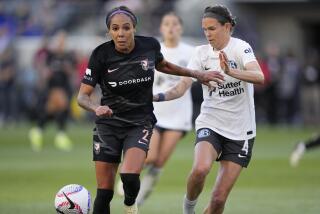NHL on Its Way Back
- Share via
The NHL and the players’ association have agreed in principle on a new collective bargaining agreement that will feature a hard salary cap linked to 54% of league revenue, a 24% rollback of existing contracts and qualifying offers, and a provision that will limit the salary of any single player to 20% of the team cap figure in any year, sources familiar with the labor negotiations said Wednesday.
The agreement, which is expected to be announced next week, also includes an NBA-style escrow provision under which 15% of each player’s paycheck will go into an escrow account until revenue is calculated after each season. If league-wide spending on salaries exceeds 54% of revenue, the difference between the salaries paid and the negotiated percentage will be paid to teams from the escrow account. If teams spend less than 54%, the escrow money will revert to players.
Negotiators are estimating revenues will be $1.8 billion next season, down from $2.1 billion in 2002-03. The salary cap will be $37 million and won’t include medical and dental benefits and pension payments. The floor will be about $24 million.
The league also agreed to let players represent their homelands at the Turin Olympics next February and will take an 18-day break to accommodate players’ travel and participation in the Games.
The All-Star game will be dropped next season, mollifying owners who opposed repeated interruptions.
A source also said each team will have an equal chance in the lottery for the No. 1 pick in this year’s entry draft. Canadian forward Sidney Crosby, touted as the next Wayne Gretzky, will probably be the top prize.
Overall, the agreement is a resounding victory for NHL Commissioner Gary Bettman, who locked players out Sept. 15 in an effort to bring about sweeping economic changes and achieve cost certainty for owners. The average NHL salary rose from $730,000 in 1994-95 to $1.83 million in 2003-04, but Bettman contended that revenue did not keep pace and that teams lost a collective $1 billion in the decade preceding the lockout.
The NHL, which became the first major professional sports league to lose an entire season to a labor dispute, will become the last of the major North American leagues to adopt salary controls.
The agreement will be presented to the 10-member NHL executive committee in New York on Monday, and the Board of Governors will rubber-stamp it late next week.
Players will debate and vote at a meeting that could be contentious; if they approve, a 10-day period will begin for teams to sign players they drafted in 2003 and other players on their reserve lists. The season probably would start in early to mid-October.
King President Tim Leiweke, a member of the NHL executive committee, declined to discuss specifics of the negotiations. “I do think the union and the league have made a lot of progress,” he said. “They’re not there, but hopefully, they’ll be there in the very near future.”
The largest unresolved issue, a source said, is the disposition of contracts for the 2004-05 season. The NHLPA wants obligations for the 2004-05 season to be respected, and the NHL opposes that but might yield, a source said.
The new deal has no luxury tax but addresses revenue sharing through a complex formula under which the top 10 revenue-earning teams will give a percentage of their revenue to small-market teams at the conclusion of each season.
Salary arbitration will be conducted “baseball style,” with each side presenting a figure and the arbitrator obligated to pick one figure or the other. Provisions will allow teams to walk away from a specified number of awards. Also, the minimum age to qualify for unrestricted free agency will be 31 in the first year of the deal, 30 the following year and 28 for the remaining four years.
In another key change, players’ performance bonuses will be restricted according to a standardized formula. Criteria such as points, ice time and plus/minus ratio will govern bonuses available to forwards. Another set of standards will apply to bonuses for defensemen, and a third set will determine bonuses for goaltenders.
As expected, earnings will be limited for entry-level players. They will be subject to salary limits for their first four seasons instead of three, as in the old agreement, and their maximum earnings will be $850,000.
*
(BEGIN TEXT OF INFOBOX)
Salary rollbacks
Some sample NHL players’ salaries under terms of the pending collective bargaining agreement, with scheduled 2004-05 figure, salary minus a 24% rollback and minus 15% to escrow:
*--* Player/Team Scheduled salary Minus rollback Minus escrow Sergei Fedorov, $8 million $6.080 million $5.168 million Mighty Ducks Jaromir Jagr, N.Y. $11 million $8.36 million* Rangers Nicklas Lidstrom, $10 million $7.60 million* Detroit Dan Boyle, Tampa Bay $2.75 million $2.09 million $1,776,500 Sean Avery, Kings $600,000 $456,000 $387,600
*--*
*Subject to maximum salary of 20% of the team’s cap per season. With the cap expected to be $37 million, Jagr’s salary would be $7.4 million, minus 15% to escrow, or $6,290,000. The same provision applies to Lidstrom.
More to Read
Go beyond the scoreboard
Get the latest on L.A.'s teams in the daily Sports Report newsletter.
You may occasionally receive promotional content from the Los Angeles Times.







